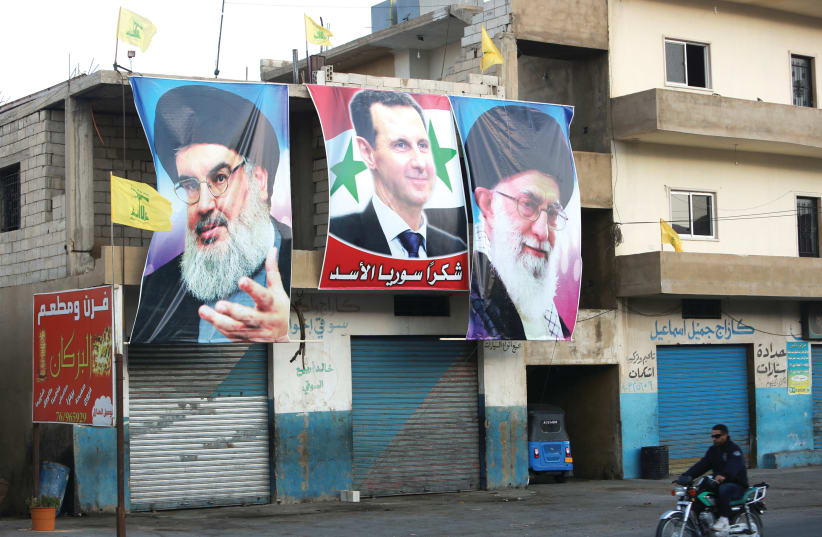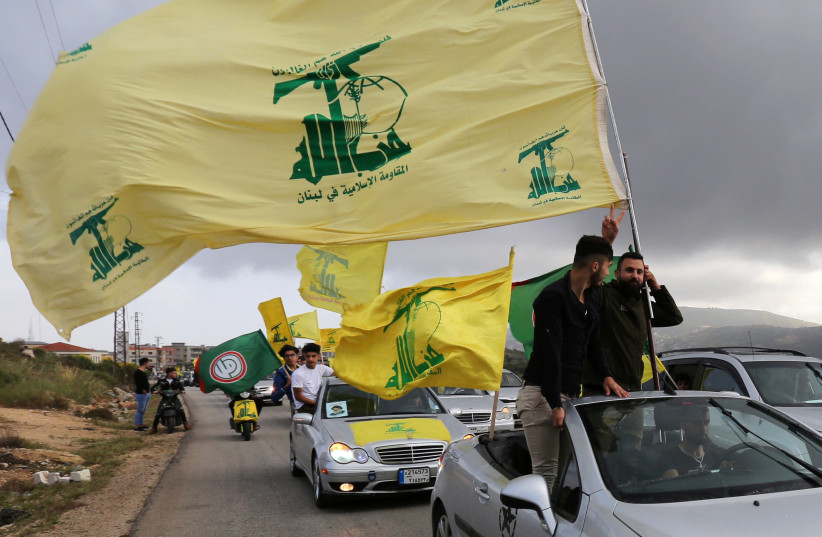Defense Minister Benny Gantz shocked Israelis last week when he revealed details of a 2018 security incident during which an Iranian drone had crossed into Israeli airspace. The Israelis downed the drone, which originated at the T4 Air Base in Syria. This much was known. But Gantz revealed that the drone was actually intended to deliver explosives to terrorist groups in the West Bank.
The episode was only one among many on the Syrian-Israeli border in recent years. The Israelis have worked overtime to battle Iranian efforts to exploit the fog of war to smuggle a wide variety of advanced weapons to terrorist groups, primarily Hezbollah in Lebanon, but apparently other groups and jurisdictions, too.
In fact, the number of Israeli operations, according to foreign press reports, has increased recently. Not a week goes by without reports of something going “boom” in Syria. It is by now well established that most of those incidents are Israeli strikes targeting Iranian personnel or the transfer of precision-guided munitions, PGMs.
The Israelis call this the “war between wars” campaign. It is a concerted and sustained effort, launched in 2012, to enforce Israel’s red lines in war-torn Syria. Jerusalem has made it clear that it will not allow Iranian personnel or Iran’s terrorist proxies to operate on Syrian soil. This includes Hezbollah, but also a significant number of Shi’ite militias that answer to their paymasters in Tehran.
Israel also insists that Syria cannot become a transshipment point for what are often euphemistically described as “game-changing weapons.” More often than not, the Israelis are referring to PGMs, PGM parts, production machines or the personnel responsible for transferring knowledge of PGM production.
With Iran’s help, Hezbollah has been manufacturing PGMs or retrofitting older, guided rockets to convert them to PGMs – all with the goal of targeting Israel. Reports suggest that they have successfully produced several dozen of these deadly munitions, or even several hundred. But they have paid a heavy price. The casualties continue to mount, and the number of shipments that have been destroyed are by now in the thousands.
Israeli officials at first kept quiet about their war between wars for fear of stoking a wider conflict. But beginning in 2019, they have lifted the veil on these activities. Political and military officials alike have revealed more and more about the thousands of targets that Israel has destroyed in Syria over the last few years.
The message appears to be tailored to one particular audience: the regime in Iran. Regime officials have repeatedly expressed their goal of hastening Israel’s demise. Such rhetoric has been constant since the Islamic Revolution of 1979. But in 2009, Supreme Leader Ali Khamenei began directing his lieutenants to invest heavily in the research and development of PGMs with the understanding that these weapons would truly be “game changers.” They would enable the regime or its proxies to strike Israeli targets within 20 feet of their intended mark. They would also potentially be able to outmaneuver Israel’s advanced air defenses. The goal would be to hit targets that would have a meaningful impact on Israeli security.
Accordingly, the IDF has declared the PGM threat to be the country’s second most dire, subordinate only to the Iranian nuclear program. Increasingly, Israel sees these two programs as interconnected. They are part of a long-term Iranian plan. Both must be stopped for Israel to live in peace. The shadow operations against both programs continue apace.
Interestingly, the Russians, who operate anti-aircraft weapons in Syria with the permission of the ruling regime, are not complaining about the ongoing Israeli strikes. Former prime minister Benjamin Netanyahu and current Prime Minister Naftali Bennett have invested considerable time and effort in convincing Russian President Vladimir Putin and his advisers that it is in Russia’s national interest to oust Iran from Syria. The Russians are open to the idea. After all, Israel has made it clear to Putin that as long as the PGM threat continues, and as long as Iran violates Israel’s “red lines,” the strikes will continue.
Without stability in Syria, the Russian investments there will be at risk. Putin understands this reality. Whether he is willing to take steps to edge Iran out of the country remains to be seen.
The regime of Syrian President Bashar Assad itself, which would not be in power were it not for Iranian intervention in the country’s civil war, is also quietly cheering on the Israeli strikes. The Iranians have simply outstayed their welcome in Syria, violating the sovereignty of an allied nation to use it as a jurisdiction for smuggling these deadly weapons.
It is for this reason that Syria has started to engage in diplomacy with Arab states, led by the United Arab Emirates, to come in from the cold. But in order for that to happen, Assad must break from Iran. This is easier said than done.
Among other reasons, the Arab states are also increasingly concerned over how the Iranian PGM project threatens Lebanon. The country is on the verge of political and economic collapse. Should the PGM smuggling to Hezbollah continue, Israel may have no choice but to destroy them. This could start a war that would devastate the country that was once considered a bastion of liberalism and wealth in the Middle East.
All of this is now occurring with the backdrop of renewed nuclear negotiations between Iran and world powers. Israel would like nothing more than to see an agreement that truly shuts down Iran’s drive for a nuclear weapon. But the Biden administration’s negotiations are not talking about such a comprehensive deal. Nor are they talking about ending the PGM program as part of these talks. This leaves Israel with no choice but to continue to wage its war between wars.
Washington understands Israel’s position. The White House is quietly ignoring the shadow campaign, while insisting that Iran could still return to negotiations and quickly evolve into a responsible stakeholder in the Middle East. This means that Israel has a window, perhaps a closing window, to deal with the PGM threat. It can do so with the tacit approval of Washington and with the almost-open endorsement of the Russians and the Syrians.
The war between wars campaign has been heating up for years. But it is now reaching new levels of intensity. Israel sees this is the only way to defend against Iran’s threats to the region. For the first time, other actors may quietly agree.
Brigadier General (Res.) Professor Jacob Nagel is a former Israeli acting national security adviser. He is now a visiting professor at the Aerospace Faculty of the Technion and a senior fellow at the Foundation for Defense of Democracies. Jonathan Schanzer is senior vice president at FDD, a former terrorism finance analyst at the United States Department of the Treasury, and author of the new book Gaza Conflict 2021: Hamas, Israel and Eleven Days of War.

